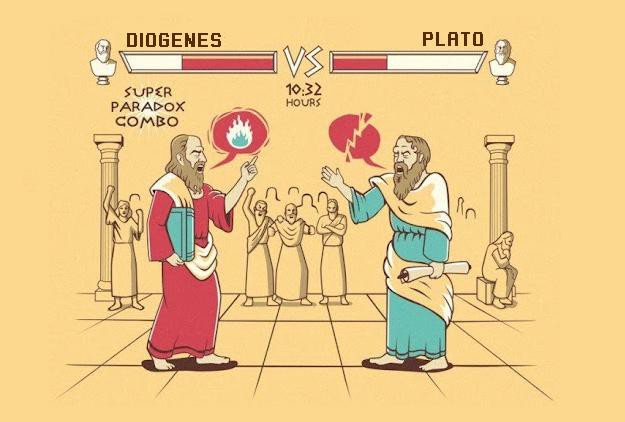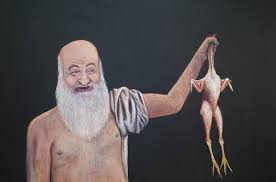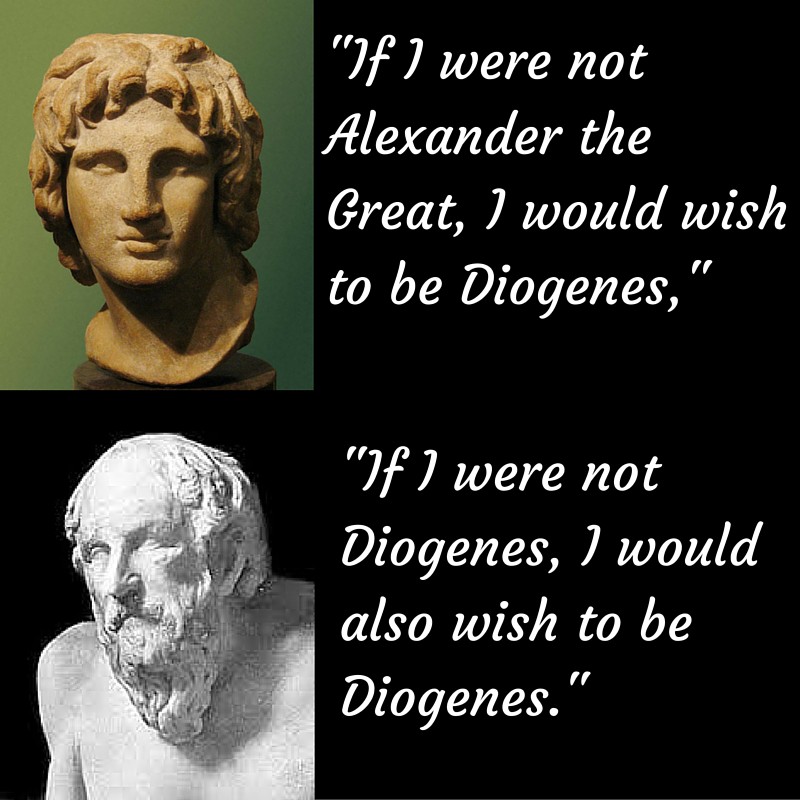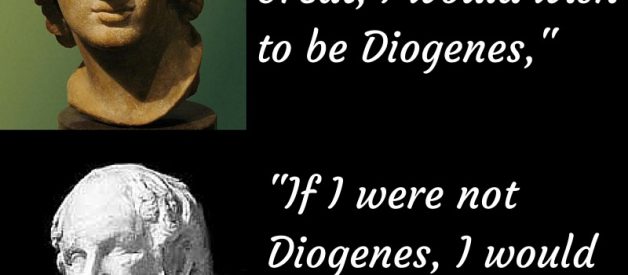
Diogenes and Plato have been battling it out for hundreds of years, the stories have captured the imaginations of readers since ancient Greece through to today. Despite being nearly 2300 years old, the battle continues to entertain as the long dead philosophers exchange witty remarks and insults like this from Diogenes ?Being reproached with begging when Plato did not beg, ?Oh yes,? says he, ?he does, but when he does so ?He holds his head down close, that none may hear.?? The historical accuracy of any such remarks is a by the by, a non event, irrelevant, we learn so much about the philosophy of Cynicism as well as seeing how far Plato’s ideas evolved because of Diogenes that this trumps historical accuracy. Much of what we have is in the form of a chreia where more often than not, Diogenes appears to have the upper hand.
A chreia was a brief, useful anecdote about a particular character. That is, a chreia was shorter than a narration ? often as short as a single sentence ? but unlike a maxim, it was attributed to a character. Usually it conformed to one of a few patterns, the most common being ?On seeing??, ?On being asked??, and ?He said??.
The chreia that we have hold importance far beyond actual historical encounters. First and foremost, it contrasts Plato and his lofty theoretical ideas with Diogenes the pragmatist. Plato was a student of Socrates and Diogenes was a student of Antisthenes who was himself a student of Socrates. This battle was no less than a battle for the legacy of Socrates. Plato relied on ideas like his Theory of Forms which is the idea that ideas are the basis for our reality. Contrast this with Diogenes who lived in the here and now, taught by example and more importantly with actions, rather than words and we can begin to see why Diogenes appears to come out favourably in many of the recorded chreia. Simply put Plato?s ideas where theoretical and academic fluff, whereas Diogenes had a philosophy of minimalism and simplicity which by default was far more accessible to all people.
When Plato gave Socrates?s definition of man as ?featherless bipeds? and was much praised for the definition, Diogenes plucked a chicken and brought it into Plato?s Academy, saying, ?Behold! I?ve brought you a man.? After this incident, ?with broad flat nails? was added to Plato?s definition.

The reality of Diogenes ?winning? or appearing more favourable in many of the recorded chreia we have is that Plato needed Diogenes to sharpen his arguments and refine his ideas. This is true to of the interactions between the Sophists and the Stoics that came onto the scene shortly after these exchanges. But I think importantly, the common sense pragmatism of Diogenes has somewhat more appeal than Plato?s highly academic somewhat removed ideas and theories.
Diogenes was knee deep in a stream washing vegetables. Coming up to him, Plato said, ?My good Diogenes, if you knew how to pay court to Dionysius, you wouldn?t have to wash vegetables.? ?And,? replied Diogenes, ?If you knew how to wash vegetables, you wouldn?t have to pay court to Dionysius.?
Of course there is also political and not just philosophical differences between the two men. Diogenes was fiercely independent, self sufficiency is a virtue in the Cynic Philosophy after all. Diogenes has been credited with being a proto-anarchist, in place of the state, was the state of being a Cynic, King unto thyself. Diogenes relied on no one for his happiness and we can see this with his interactions with Alexander the Great the best example of a comparison between two kings, the King of the known world Alexander and the king over himself Diogenes.

Plato by contrast had a highly ordered society that we can see on display in his ?The Republic?. Society ought to be structured and people have their place wherever that may be. Its all well and good to look at the theoretical aspect of Plato?s Republic, but the reality is also that he was in the court of Dionysius the tyrant as we saw earlier with the vegetable washing chreia. Diogenes was accused of begging but in actual fact was only asking for payment for delivering public lectures and education on matters such as virtue and the good life, Plato by contrast had the Academy which we would consider private education for wealthy students only. This isn’t of course an essay on public/private education, but it is about contrasting two world views, one that challenges the status quo at all times in as shocking a manner as possible, and the other that maintained order and social structure. Most of what I have said to date has been commentary on the age old battle ground of chreia. I wish to extend the battle a bit more to the view Plato and Diogenes took of their slaves. As we know Diogenes was a fierce individualist and Plato had his structured society. Seneca picks up the batten from Plato at this point and carries forth many of these ideas.
For as Plato says ?A sensible person does not punish a man because he has sinned, but in order to keep him from sin; for while the past cannot be recalled, the future may be forestalled.?
Seneca was my gateway philosopher into the world of philosophy. He is easy to read, poetic even, his writings can bring to life the ancient world in a way that it reflects our own making his work feel like it hasn’t aged a day in 2000 years. So I have always held Seneca’s essay ?On Anger? in high regard and nodded along in agreement with what he had to say. But Seneca and Plato are both coming from a position where an ordered society is the best for them and both were in a position to wish for that to continue. This is because both of them were in the courts of tyrants and must have felt it was better to be there than on the receiving end of any wrath dealt by said tyrants. But in living such a way they never experienced the freedom that Diogenes had.
Plato once, when he was angry with his slave, was unable to impose delay upon himself, and, bent upon flogging him with his own hand, ordered him forthwith to take off his shirt and bare his shoulders for the blows; but afterwards realizing that he was angry he stayed his uplifted hand, and just as he was stood with his band in the air like one in the act of striking.
It may be admirable that Plato never hit his slave in Seneca’s retelling of events. But of course Plato was always going to get mad because in his world view he had his place and the slave had his own place and Plato must have felt like their was some sort of transgression. As the previous quote shows, while Plato was aware he shouldn’t have gotten angry, his world view meant that punishment towards another was fitting and necessary, which is why he got angry in the first place because he knew he had to exact this punishment, but then realised he was angry. Its like a paradox. Diogenes by contrast showed no such stress or worries about his slave acting in a far worse manner than that of Plato’s.
When he was advised to go in pursuit of his runaway slave, he replied, ?It would be absurd, if Manes can live without Diogenes, but Diogenes cannot get on without Manes.?
Diogenes is said to have lost Manes, if he ever existed, on his trip from Sinope to Athens. Of course in losing Manes, his relinquishment of goods, luxuries, and what others considered necessary was complete. He was now completely free in a way that only poverty and exile can bring about. Diogenes was now a philosopher and held right opinions about his situation and those around him. There was nothing to get angry about, he had nothing to lose, he never even needed to calm himself down like Plato does because he is living in the moment and free. Whilst the battle between Diogenes and Plato does not officially extend to these stories of how they treat their slaves, I like to think again that Diogenes comes out better off and is the better role model for 2015.


